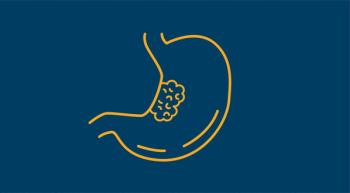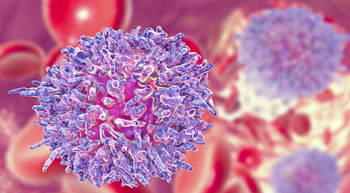
An analysis of 141 children who had prenatal exposure to maternal cancer showed promising cognitive and behavioral functions at age 9 years.

An analysis of 141 children who had prenatal exposure to maternal cancer showed promising cognitive and behavioral functions at age 9 years.

Both the gastric and breast cancer HER2 scoring algorithms may be useful in determining which patients with metastatic colorectal cancer may derive benefit with tucatinib/ trastuzumab.

January is cervical cancer awareness month. This third article in a series highlights current cervical cancer treatment options.

For patients with CLDN18.2-positive, HER2-negative locally advanced unresectable or metastatic gastric/gastroesophageal junction adenocarcinoma, treatment with zolbetuximab/mFOLFOX6 yielded a progression-free survival (PFS) of 10.61 months whereas placebo/mFOLFOX6 resulted in a PFS of 8.67 months.

In an all-randomized population of patients with advanced gastric cancer, gastroesophageal junction, or esophageal adenocarcinoma, adding nivolumab to chemotherapy yielded a 21% reduction in the risk of death.

Patients with advanced hepatocellular carcinoma experienced similar health-related quality of life scores whether they received a combination of pembrolizumab and lenvatinib or lenvatinib and placebo.

Jamie Carroll, APRN, CNP, MSN, offers her perspective on emerging data from the 2022 San Antonio Breast Cancer Symposium.

The FDA has approved zanubrutinib for patients with chronic lymphocytic leukemia or small lymphocytic lymphoma. The prescribing label comes with warnings for hemorrhage, infections, cytopenias, second primary malignancies, and cardiac arrythmias.

The FDA has granted accelerated approval to tucatinib and trastuzumab for RAS wild-type, HER2-positive metastatic colorectal cancer. The prescribing information includes warnings for diarrhea and hepatotoxicity.

There continues to be an unmet need for effective and tolerable frontline treatments for patients with squamous cell carcinoma of the head and neck, according to investigators.

January is cervical cancer awareness month. This second article in a series highlights current cervical screening guidelines.

The American Society of Clinical Oncology (ASCO) has updated its guidelines providing recommendations for the management of cancer pain with opioids.

A decision model with a 10-year time horizon found that nivolumab plus ipilimumab was the most effective combination for patients with metastatic renal cell carcinoma, but sunitinib was the most cost-effective approach.

Moxetumomab pasudotox-tdfk, a treatment for patients with relapsed/refractory hairy cell leukemia, will be permanently discontinued.

Among 17 patients with mantle cell lymphoma, the complete remission rate with first-line treatment with zanubrutinib plus rituximab followed by short-course rituximab plus dexamethasone, high-dose cytarabine, and oxaliplatin was 88.2%.

Patients with heavily pretreated, platinum-resistant ovarian cancer showed promising responses with a triplet regimen consisting of COM701, BMS-986207, and nivolumab.

Findings showed that Black patients were 4.3 percentage points less likely to receive any opioid and 3.1 percentage points less likely to receive long-acting opioids near end-of-life compared with White patients.

Neoadjuvant treatment with gemcitabine and split-dose cisplatin followed by surgical resection and lymph node dissection proved to be effective and well-tolerated for patients with high-risk upper tract urothelial carcinoma.

Nilesh Kalariya, PhD, AGPCNP-BC, AOCNP, discusses key data of interest from the 2022 American Society of Hematology Meeting.

Laura J. Zitella, MS, RN, ACNP-BC, AOCN, highlights her top takeaways from the 64th American Society of Hematology Annual Meeting and Exposition.

Adding induction to standard chemoimmunotherapy followed by autologous stem cell transplantation and maintenance ibrutinib was highly effective in patients with mantle cell lymphoma.

Zanubrutinib demonstrated a superior reduction in the risk of progression or death for patients with relapsed or refractory chronic lymphocytic leukemia or small lymphocytic lymphoma compared with ibrutinib.

The American Society of Clinical Oncology (ASCO) has released new guidelines providing recommendations for the optimal treatment of patients with advanced gastroesophageal cancer.

For patients with head and neck cancer who cannot access full-dose checkpoint inhibitors, adding low-dose nivolumab to metronomic chemotherapy may represent an acceptable alternative treatment approach.

January is cervical cancer awareness month. This first article in a series highlights educational efforts on disease prevention through vaccination and empowering programs such as the Quilt Project.

Adjuvant treatment with hepatic arterial infusion chemotherapy-infused FOLFOX improved disease-free survival rates for patients with hepatocellular carcinoma with microvascular invasion.

Loyda Braithwaite, MSN, RN, AGPCNP-BC, AOCNP, reflects on data presented at the San Antonio Breast Cancer Symposium.

Patients with hormone receptor–positive, HER2-negative metastatic breast cancer derived benefit with sacituzumab govitecan regardless of Trop-2 expression.

A combined regimen of mitazalimab and mFOLFIRINOX resulted in a 52% objective response rate among 23 patients with metastatic pancreatic cancer.

Jamie Carroll, APRN, CNP, MSN, weighs in on how findings from the POSITIVE study may change dialogue surrounding pregnancy for women with estrogen receptor–positive breast cancer who wish to pause adjuvant therapy.